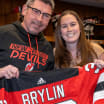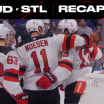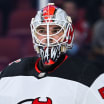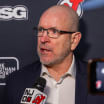New Jersey Devils Official Podcast
·
Scott Clemmensen | Speak of the Devils
Scott Clemmensen, 43, delivers the same message to the Devils' collection of prospects every summer at the club's rookie development camp. Though the Devils' director of Goaltending Development mostly addresses his young netminders, the words reverberate around the room.
"The message that I have to everyone," he said, "and I draw on my own experience with this but even the Devils themselves are a good example, in this locker room we have first-round picks, second-, third-, fourth-, seventh-round picks, we have free agents that weren't picked at all, and invitees that weren't picked at all.
"I can tell you this, it doesn't matter where you were picked. Someone else might have more ability than you but if you work and you're able to adapt and you can work your way up, you can be better. You can take someone's job. Even if they're a first-rounder, you can take their job."
Clemmensen, who has been instrumental in the development of New Jersey goaltender Mackenzie Blackwood, isn't just preaching. At one point in life, he was in the choir.
PODCAST: Clemmensen's Career a Testimony of Adaption Over Talent
The lessons Clemmensen learned in his pro career are now being passed on to the next generation of Devils netminders
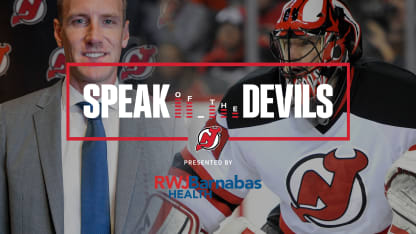
PAST DEVILS PODCASTS
SPEAK OF THE DEVILS PODCAST
New Jersey Devils Official Podcast
·
Duggan Joins the Devils
Esche Full Circle with Utica Devils
Jonas Siegenthaler
Nolan Foote
Ty Smith
GM Fitzgerald and Subban
Tyce Thompson
The Original Devil: Chico Resch
Sherry Ross
"I did it myself," said Clemmensen, who enjoyed a 14-year pro career after being an eighth-round pick (215th overall) by New Jersey in 1997. "There's no reason anyone else can't do it. That's what it's about. It's not about who has the most talent, who's the strongest, fastest. It's who can adapt and be able to work hard and continue to improve."
Clemmensen, a native of Des Moines, Iowa, arrived at his first NHL training camp in 2001 fresh off of winning an NCAA national championship with Boston College. When he got to New Jersey, he saw a future Hall of Fame goaltender Martin Brodeur, and three goalies selected in the first round (Brodeur, 1990; Jean-Francois Damphousse, '97; Ari Ahonen, '99).
"I wasn't the most talented. I never was my whole career," admitted Clemmensen, who joined the development staff in 2015. "But I think one thing I was able to do better than some of the others … was to adapt, to learn, to take this club out of my bag, which I do now, maybe throw it out and put another one in. I was able to say this is what you need to do to play, to get better. I was able to do those things as opposed to relying on my talent because that wouldn't do it for me.
"That was the key for me, to continue to improve and to do that, there was an adaption process, on the ice, off the ice, all the technical stuff. If you're just going on raw ability, at some point everyone else's ability catches up with you. If you're not improving, you're going to get passed by."
Getting passed by is exactly what happened to Damphousse and Ahonen in that training camp. Clemmensen found himself on an NHL roster straight out of college, something he hadn't imagined at the start of the camp.
"I was scared to go to the East Coast League. I was so scared of that league. I just wanted to make sure I made that team in Albany," he said of the Devils' American Hockey League affiliate at the time. "I was trying to make the Albany team, and I'm (suddenly) on the big club."
Little did the 6-foot-2 tender know, he would make his NHL debut in the Devils' season-opener Oct. 6 at Washington. After 40 minutes, the Capitals jumped out to a 5-1 lead and had a power-play carrying over into the third period.
"(Goaltending coach) Jacques Caron comes into the locker room. He's speaking French with Marty," Clemmensen recalled. "No idea what they're saying. Jacques looks at me and says, 'OK kid, you're in.' OK, here we go."
On the opening faceoff of the third period, John Madden took a penalty. Now Clemmensen and the Devils are facing a 5-on-3 against one of the most lethal power plays in the NHL. The first shot Clemmensen faced in the NHL was a one-timer from Peter Bondra. It was also the first goal he allowed.
"I always say I let my first shot go in in the NHL," he said. "But my second shot was on Jagr; so my first save was on Jaromir Jagr on the second shot of my NHL career."
It would be the only goal Clemmensen allowed in that third period as the Devils fell 6-1. He remained on the Devils for another month until he found himself, perhaps, unfortunately, in the same room as then-general manager Lou Lamoriello.
"I remember sitting in the lounge at the practice facility in South Mountain. And Lou Lamoriello, it's just me and him," Clemmensen remembered. "I should have just left. I should have just left the rink. I was waiting for Brian Gionta to get showered up and change.
"(Lamoriello is) looking at me. I'm not saying anything. I'm just looking around. I can feel him looking at me. He looks at me and goes, 'Clemmer, we're going to get you down to Albany, play some games.' I get it. I hadn't played yet. I'm just out of college. I'm not ready for the NHL."
Instead of asking why he was being sent down the American League, Clemmensen pulled a slight ruse.
"I was thinking, this is a smart question," he said. "So I asked Lou, 'How long should I pack for?'
He goes, 'Oh, about two weeks.' So, I'm thinking OK. So I pack my bags for weeks. I go down to Albany.
"I was there for two years."
Indeed, two years later on Jan. 20, 2004, Clemmensen would suit up in Pittsburgh in his first-career NHL start. Which was also his first-career NHL shutout after stopping all 25 Penguins shots. Still, it would take another four years before Clemmensen established himself as an NHL regular. In 2008-09, the Devils lost Brodeur to a torn bicep tendon and Clemmensen and Kevin Weekes were jockeying to fill the role.
Clemmensen lost his first two games in net after his recall from the AHL. But his entire career trajectory changed in that third game. It was against the Capitals. Alexander Ovechkin scored a late regulation goal to force a 4-4 overtime. The contest progressed to a shootout.
After Clemmensen stopped Ovechkin and Viktor Kozlov, he only needed to make one final save to get New Jersey the victory. He anticipated seeing a Nicklas Backstrom, an Alexander Semin or a Mike Green hop over the boards. Instead, he saw Boyd Gordon.
"I don't want to put Boyd Gordon down," Clemmensen rationalized, "but I'm thinking if you pass up Nick Backstrom and all these other guys to go with Boyd Gordon, I'm assuming he's got a real good move that he goes to in practice and scores on a lot. I'm not exactly sure what he's going to do. So I decide to throw a poke check just to disrupt him. If he's going to do some crazy move, make him do something else at the very least."
Gordon never had a chance to do something else. The poke-check knocked the puck off of his stick and the Devils won the game. That win also sparked an 11-1-1 stretch between the pipes for Clemmensen en route to a career-best 25-win season.
"I have a picture of that poke-check that's blown up," he said. "That was a real turning point in my career. (Coach) Brent Sutter keeps playing me.
"If I had lost that shootout and lost three straight games, they probably would have gone back to Kevin Weekes. My career would have been much different. That poke-check on Boyd Gordon to secure that win was a real turning point in my career."
Instead, that career turned into 191 games played and a 73-59-24 record. And the lessons Clemmensen learned during his career have carried over into his new job as director of Goaltender Development.
"I was able to just build myself as a goalie," he said. "As opposed to being born a goalie, I was built a goalie."
And now he's building the current and next generations of Devils goaltenders.






